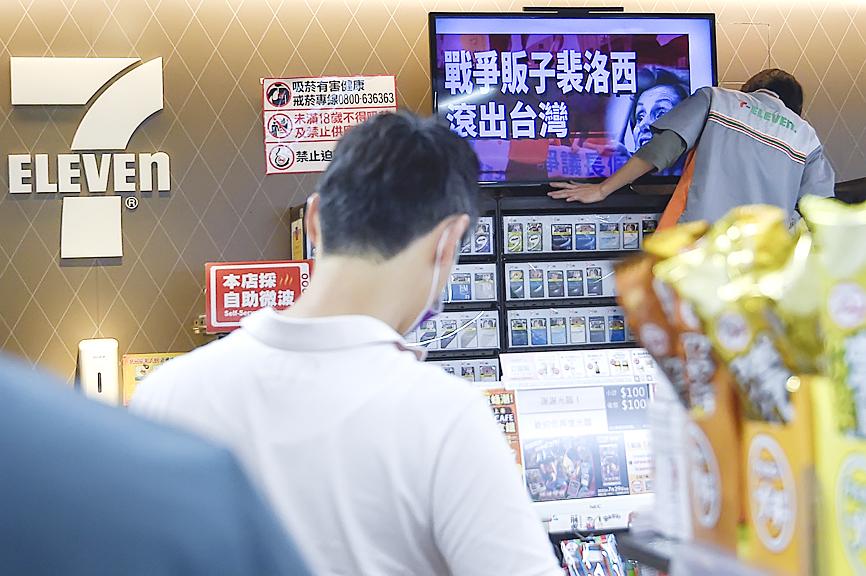The Executive Yuan is considering an amendment to the Principles on Limiting Harmful Products Against National Information Security Used by Government Agencies (各機關對危害國家資通安全產品限制使用原則) in response to recent Chinese cyberattacks, a person with knowledge of the matter said.
An explicit ban on all hardware and software made in China would target government agencies and companies renting equipment for critical infrastructure, the source said.
The amendment would follow Minister Without Portfolio Wu Tze-cheng (吳澤成) saying that the Executive Yuan should reprimand agencies and companies that used easily hacked equipment that led to Taiwan High Speed Rail Co’s Xinzuoying Station’s digital billboard being compromised.

Photo: Chen Chih-chu, Liberty Times
Shortly after US House of Representatives Speaker Nancy Pelosi arrived in Taiwan on Wednesday last week, Chinese hackers obtained access to screens in 7-Eleven stores at Xinzuoying Station.
Government agencies would be required to incorporate a ban on Chinese components in suppliers’ contracts, with digital billboards and surveillance cameras the primary concerns, the source said.
The Executive Yuan on April 19, 2019, issued an administrative order for agencies to conduct an equipment inventory for China-made products, the person said.
As of Dec. 18, 2020, the Executive Yuan notified all governmental agencies that it had banned the use of all Chinese brands.
The agencies were ordered to have all Chinese-made equipment used internally and by subcontractors replaced by the end of last year, the source said.
The amendment would address the gaps that allowed compromised digital billboards to be rented by companies operating parts of the nation’s infrastructure, the person said.
The cyberattack demonstrated the potential for malicious spreading of inappropriate messages in public locations, prompting the Executive Yuan’s National Center for Cyber Security Technology to push for the amendment, the source said.

Taiwan is to commence mass production of the Tien Kung (天弓, “Sky Bow”) III, IV and V missiles by the second quarter of this year if the legislature approves the government’s NT$1.25 trillion (US$39.78 billion) special defense budget, an official said yesterday. Commenting on condition of anonymity, a defense official with knowledge of the matter said that the advanced systems are expected to provide crucial capabilities against ballistic and cruise missiles for the proposed “T-Dome,” an advanced, multi-layered air defense network. The Tien Kung III is an air defense missile with a maximum interception altitude of 35km. The Tien Kung IV and V

The disruption of 941 flights in and out of Taiwan due to China’s large-scale military exercises was no accident, but rather the result of a “quasi-blockade” used to simulate creating the air and sea routes needed for an amphibious landing, a military expert said. The disruptions occurred on Tuesday and lasted about 10 hours as China conducted live-fire drills in the Taiwan Strait. The Civil Aviation Administration (CAA) said the exercises affected 857 international flights and 84 domestic flights, affecting more than 100,000 travelers. Su Tzu-yun (蘇紫雲), a research fellow at the government-sponsored Institute for National Defense and Security Research, said the air

Taiwan lacks effective and cost-efficient armaments to intercept rockets, making the planned “T-Dome” interception system necessary, two experts said on Tuesday. The concerns were raised after China’s military fired two waves of rockets during live-fire drills around Taiwan on Tuesday, part of two-day exercises code-named “Justice Mission 2025.” The first wave involved 17 rockets launched at 9am from Pingtan in China’s Fujian Province, according to Lieutenant General Hsieh Jih-sheng (謝日升) of the Office of the Deputy Chief of the General Staff for Intelligence at the Ministry of National Defense. Those rockets landed 70 nautical miles (129.6km) northeast of Keelung without flying over Taiwan,

A strong continental cold air mass is to bring pollutants to Taiwan from tomorrow, the Ministry of Environment said today, as it issued an “orange” air quality alert for most of the country. All of Taiwan except for Hualien and Taitung counties is to be under an “orange” air quality alert tomorrow, indicating air quality that is unhealthy for sensitive groups. In China, areas from Shandong to Shanghai have been enveloped in haze since Saturday, the ministry said in a news release. Yesterday, hourly concentrations of PM2.5 in these areas ranged from 65 to 160 micrograms per cubic meter (mg/m³), and pollutants were